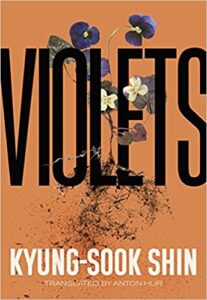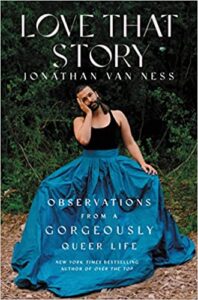Another day, another book ban. Did you hear the one about the author who was told not to read the book It’s Okay To Be a Unicorn! because a parent complained there was a rainbow on it? I’ll admit, after years of covering this, my eyes are starting to glaze over when I see a new, more ridiculous book ban or educational gag order. After all the work queer people and people of color have done over the years to move the needle just an inch forward, it’s depressing to see this massive backslide. But apathy is just what they want for us, so it’s time to dig deep and keep fighting for inclusive education and access to diverse books. We can’t let these right-wing “parent rights” groups take away all the progress that’s been made.
And while I’m on the topic, might I recommend donating to EveryLibrary? They’ve been fighting for libraries and against censorship throughout this tidal wave of book bans, and they’re building networks of support across the country to keep the fight going and prevent future censorship. For more information, check out the post for the matching campaign we did for them in 2021.
The Unique Relationship Between Queer Media and Spoilers
Something happened in the finale to Killing Eve. You know what’s funny? I would bet a majority of you reading this already know what it is, even if you have never watched an episode, just from that sentence. (If you don’t and you don’t want to know, maybe skip this part of the newsletter, because it will be implied. I won’t discuss it directly, though.)
Queer media has a special relationship to spoilers. For a brief moment on the queer bookternet, there was a debate about whether mentioning a character’s orientation or gender identity in a review counted as a spoiler. Pretty quickly, it was summarily declared that no, that’s not a spoiler. Even if the character doesn’t come out until 3/4 of the way through the book, you’re still within your rights to talk about it as a queer book and name the specific representation included. As a queer bookish community, we have rejected the idea of queer identity as plot twist.
(Spoilers for Buffy the Vampire Slayer and The 100 ahead!)
Before I started watching Buffy proper (I had seen episodes here and there as a kid, but I didn’t sit down to watch it from beginning to end until college), I knew Tara died. I couldn’t tell you where I learned it, but it was an event that permeated the sapphic consciousness. Similarly, I knew almost the moment Lexa was killed on The 100 — in a depressingly parallel way to Tara — despite not watching the show and not seeking the information out.
I was glad for these spoilers. While most media outlets would see a backlash to spoiling a TV show in the title of an article, those responses were rare in these cases. That’s because many queer people only want to pick up a book or start a TV show with queer characters if they know those characters are okay in the end.
When Lexa died, Autostraddle put together a list of the hundreds of dead sapphic characters on TV from 1976 to the present. They determined that bi women and lesbian characters were exponentially more likely to be killed off than straight characters.
This phenomena (dubbed “Bury Your Gays”) isn’t isolated to TV. In the days of lesbian pulp fiction (mostly the 1950s-60s), there were hundreds of books about lesbians — but to get past the censors, they had to have an unhappy ending, so it didn’t seem like the books were condoning homosexuality. Some popular strategies were killing a character off, having a character magically become straight again, institutionalizing one, etc, etc.
This is the foundation from which we consume queer media. Although it’s improved a lot in recent years, most of us are still all full up on stories that imply that being queer leads to a tragic end. For queer people just coming out or who live in a hostile environment, queer media is usually a way to escape, and getting hit with the death of a character you relate to when you were looking for something affirming and comforting can be devastating.
This is why spoilers take on a different meaning when it comes to queer media. Most people who write about queer media online have a sense of responsibility to their readers, an obligation to warn them about media that may be harmful. This overrides any concerns about spoiling a TV show or book.
When I watched Buffy, I was braced for Tara’s death. (I was not prepared for her to temporarily lose her connection to reality, a deep fear of my own, so that sent me into a tailspin.) I’m grateful that it was spoiled for me, because as I empathized with this character and saw my queer identity reflected in her, I also some defenses put up. I can’t imagine what it would have been like to see her happiness snuffed out by a stray bullet if I hadn’t seen it coming.
So, if you ever wonder why a queer review site or blog spoils a major character’s death, that’s why. We rely on each other to alert us to stories that could reopen old wounds. It may be that you don’t need those kinds of warnings, but as long as some of us do, I’ll always be on that side of the spoiler line when in comes to tragic queer media.
Don’t forget you can get three free audiobooks at Audiobooks.com with a free trial!
All the Links Fit to Click
- Publishers Weekly interviewed authors of LGBTQ books about their books being banned.
- Instruction About LGBTQ People in Elementary School Is Age-Appropriate
- For International Asexuality Day, LGBTQ Reads shared a list of ace book recommendations.
- There are a lot of think pieces about the Killing Eve finale, which departs from the books. Spoilers ahead.
- Danica Roem was interviewed at Time about her new book and her roadmap for protecting trans kids. I always like seeing my name siblings doing awesome things.
Book Riot Censorship Posts
- There Were 1,145 Unique Books Challenged in US Schools Between July and March (and 33% of them were LGBTQ)
- LGBTQ Rights Groups Sue Florida Over “Don’t Say Gay” Education Bill
- “We Must Ban Books That Omit The Truth”: Debrief on the House Hearing on Book Bans and Censorship
- Williamson County (TN) Schools Lock Students Out of Digital Resources (because it included a book called An ABC of Equality)
- No Actions Offered to Librarians to Help With Book Bans From National Organization
LGBTQ Book Riot Posts
- April Showers Bring Queer Flowers: Your Curated Queer TBR For Spring
- Whether You’re a Gentleman Pirate or a Blackbeard, You’ll Love These 10 Books Like Our Flag Means Death
- 20 Must-Read Queer Poetry Collections
- Queer Book Characters Who Had Me Beyond Obsessed
- Nimona is Being Made Into a Netflix Movie!
- What Books Belong in the Queer YA Canon?
- Oh Yes, It’s Ladies Fight: 10 Fiery F/F Enemies to Lovers Fantasy Books
New Releases This Week
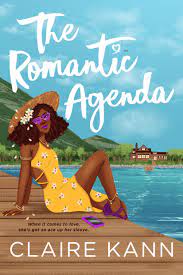
The Romantic Agenda by Claire Kann (Asexual Romance)
You might remember Claire Kann for her asexual YA romance Let’s Talk About Love or one of her other queer YA books, but this is her first foray until adult romance! The Romantic Agenda also has an asexual main character, Joy. Joy is in love with her best friend, Malcolm, but he’s interested in Summer. In order to get his attention, she starts fake dating Fox, Summer’s ex, while they’re all on a summer vacation together. But maybe Fox is what she’s been looking for this whole time…
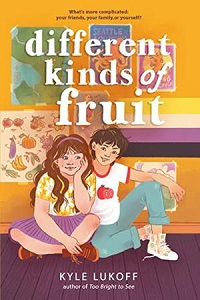
Different Kinds of Fruit by Kyle Lukoff (Non-binary Love Interest, Trans Parent Middle Grade Contemporary)
When Annabelle meets the new kid at school, Bailey, she’s immediately smitten with them. What she isn’t expecting is for her dad to say that him and Bailey have something in common: they’re both trans. Soon, Annabelle realizes her community isn’t accepting as she thought — and she’s determined to make it somewhere that her dad and her new friend (and crush) can feel like they belong. Along the way, she realizes that strict categories like boy and girl or fruit and vegetable aren’t as meaningful as they first appeared.
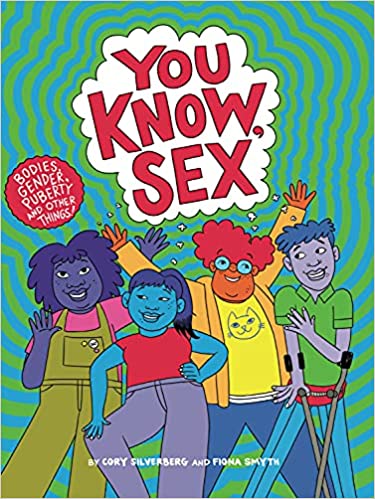
You Know, Sex: Bodies, Gender, Puberty, and Other Things by Cory Silverberg and Fiona Smyth (Queer- and Trans-Inclusive Middle Grade Nonfiction)
This is the third in a series of LGBTQ-inclusive sex ed and puberty books for kids, starting with What Makes a Baby and Sex Is a Funny Word. This volume is aimed at ages 10 and up, and it covers changing bodies, consent, pornography, trauma, boundaries, and everything else young adults are curious about when it comes to sex and puberty. Both the text and illustrations are inclusive of all bodies, including trans and intersex people, disabled people, and people of color. It’s sex ed from a social justice lens. Get it before it’s banned! (lolsob)
Violets by Kyung-Sook Shin, translated by Anton Hur (Sapphic Fiction)
Boy Overboard by Miski Harris (M/M Romance)
No Rings Attached by Rachel Lacey (F/F Romance)
The Language of Roses by Heather Rose Jones (Queer Beauty and the Beast Retelling)
Chef’s Kiss by Jarrett Melendez, Danica Brine, Hank Jones, and Hassan Otsmane-Elhaou (Gay M/M Graphic Novel)
Blaine for the Win by Robbie Couch (Gay YA Contemporary)
Meet Cute Diary by Emery Lee (Trans M/M YA Contemporary) (Paperback Rerelease)
Boys of The Beast by Monica Zepeda (Gay YA Contemporary)
Survive the Dome by Kosoko Jackson, narrated by Kevin R. Free (M/M YA Dystopia) (Audiobook Rerelease)
The Young Activist’s Dictionary of Social Justice by duopress labs and Ryse Tottingham, illustrated by Andy Passchier (Children’s Nonfiction)
Love That Story: Observations from a Gorgeously Queer Life
by Jonathan Van Ness (Non-Binary Memoir)
That’s it for me this week! Until next time, you can find me at my bi and lesbian book blog, the Lesbrary, as well as on Twitter @danikaellis. You can also hear me on All the Books or you can read my Book Riot posts.
Happy reading!
Danika
